Metadata-Version: 2.1
Name: fastapi
Version: 0.81.0
Summary: FastAPI framework, high performance, easy to learn, fast to code, ready for production
Home-page: https://github.com/tiangolo/fastapi
Author: Sebastián Ramírez
Author-email: tiangolo@gmail.com
Requires-Python: >=3.6.1
Description-Content-Type: text/markdown
Classifier: Intended Audience :: Information Technology
Classifier: Intended Audience :: System Administrators
Classifier: Operating System :: OS Independent
Classifier: Programming Language :: Python :: 3
Classifier: Programming Language :: Python
Classifier: Topic :: Internet
Classifier: Topic :: Software Development :: Libraries :: Application Frameworks
Classifier: Topic :: Software Development :: Libraries :: Python Modules
Classifier: Topic :: Software Development :: Libraries
Classifier: Topic :: Software Development
Classifier: Typing :: Typed
Classifier: Development Status :: 4 - Beta
Classifier: Environment :: Web Environment
Classifier: Framework :: AsyncIO
Classifier: Framework :: FastAPI
Classifier: Intended Audience :: Developers
Classifier: License :: OSI Approved :: MIT License
Classifier: Programming Language :: Python :: 3 :: Only
Classifier: Programming Language :: Python :: 3.6
Classifier: Programming Language :: Python :: 3.7
Classifier: Programming Language :: Python :: 3.8
Classifier: Programming Language :: Python :: 3.9
Classifier: Programming Language :: Python :: 3.10
Classifier: Topic :: Internet :: WWW/HTTP :: HTTP Servers
Classifier: Topic :: Internet :: WWW/HTTP
Requires-Dist: starlette==0.19.1
Requires-Dist: pydantic >=1.6.2,!=1.7,!=1.7.1,!=1.7.2,!=1.7.3,!=1.8,!=1.8.1,<2.0.0
Requires-Dist: requests >=2.24.0,<3.0.0 ; extra == "all"
Requires-Dist: jinja2 >=2.11.2,<4.0.0 ; extra == "all"
Requires-Dist: python-multipart >=0.0.5,<0.0.6 ; extra == "all"
Requires-Dist: itsdangerous >=1.1.0,<3.0.0 ; extra == "all"
Requires-Dist: pyyaml >=5.3.1,<7.0.0 ; extra == "all"
Requires-Dist: ujson >=4.0.1,!=4.0.2,!=4.1.0,!=4.2.0,!=4.3.0,!=5.0.0,!=5.1.0,<6.0.0 ; extra == "all"
Requires-Dist: orjson >=3.2.1,<4.0.0 ; extra == "all"
Requires-Dist: email_validator >=1.1.1,<2.0.0 ; extra == "all"
Requires-Dist: uvicorn[standard] >=0.12.0,<0.18.0 ; extra == "all"
Requires-Dist: python-jose[cryptography] >=3.3.0,<4.0.0 ; extra == "dev"
Requires-Dist: passlib[bcrypt] >=1.7.2,<2.0.0 ; extra == "dev"
Requires-Dist: autoflake >=1.4.0,<2.0.0 ; extra == "dev"
Requires-Dist: flake8 >=3.8.3,<6.0.0 ; extra == "dev"
Requires-Dist: uvicorn[standard] >=0.12.0,<0.18.0 ; extra == "dev"
Requires-Dist: pre-commit >=2.17.0,<3.0.0 ; extra == "dev"
Requires-Dist: mkdocs >=1.1.2,<2.0.0 ; extra == "doc"
Requires-Dist: mkdocs-material >=8.1.4,<9.0.0 ; extra == "doc"
Requires-Dist: mdx-include >=1.4.1,<2.0.0 ; extra == "doc"
Requires-Dist: mkdocs-markdownextradata-plugin >=0.1.7,<0.3.0 ; extra == "doc"
Requires-Dist: typer >=0.4.1,<0.5.0 ; extra == "doc"
Requires-Dist: pyyaml >=5.3.1,<7.0.0 ; extra == "doc"
Requires-Dist: pytest >=6.2.4,<7.0.0 ; extra == "test"
Requires-Dist: pytest-cov >=2.12.0,<4.0.0 ; extra == "test"
Requires-Dist: mypy ==0.910 ; extra == "test"
Requires-Dist: flake8 >=3.8.3,<6.0.0 ; extra == "test"
Requires-Dist: black == 22.3.0 ; extra == "test"
Requires-Dist: isort >=5.0.6,<6.0.0 ; extra == "test"
Requires-Dist: requests >=2.24.0,<3.0.0 ; extra == "test"
Requires-Dist: httpx >=0.14.0,<0.19.0 ; extra == "test"
Requires-Dist: email_validator >=1.1.1,<2.0.0 ; extra == "test"
Requires-Dist: sqlalchemy >=1.3.18,<1.5.0 ; extra == "test"
Requires-Dist: peewee >=3.13.3,<4.0.0 ; extra == "test"
Requires-Dist: databases[sqlite] >=0.3.2,<0.6.0 ; extra == "test"
Requires-Dist: orjson >=3.2.1,<4.0.0 ; extra == "test"
Requires-Dist: ujson >=4.0.1,!=4.0.2,!=4.1.0,!=4.2.0,!=4.3.0,!=5.0.0,!=5.1.0,<6.0.0 ; extra == "test"
Requires-Dist: python-multipart >=0.0.5,<0.0.6 ; extra == "test"
Requires-Dist: flask >=1.1.2,<3.0.0 ; extra == "test"
Requires-Dist: anyio[trio] >=3.2.1,<4.0.0 ; extra == "test"
Requires-Dist: types-ujson ==4.2.1 ; extra == "test"
Requires-Dist: types-orjson ==3.6.2 ; extra == "test"
Requires-Dist: types-dataclasses ==0.6.5 ; extra == "test" and ( python_version<'3.7')
Project-URL: Documentation, https://fastapi.tiangolo.com/
Provides-Extra: all
Provides-Extra: dev
Provides-Extra: doc
Provides-Extra: test

FastAPI framework, high performance, easy to learn, fast to code, ready for production




---
**Documentation**: https://fastapi.tiangolo.com
**Source Code**: https://github.com/tiangolo/fastapi
---
FastAPI is a modern, fast (high-performance), web framework for building APIs with Python 3.6+ based on standard Python type hints.
The key features are:
* **Fast**: Very high performance, on par with **NodeJS** and **Go** (thanks to Starlette and Pydantic). [One of the fastest Python frameworks available](#performance).
* **Fast to code**: Increase the speed to develop features by about 200% to 300%. *
* **Fewer bugs**: Reduce about 40% of human (developer) induced errors. *
* **Intuitive**: Great editor support. Completion everywhere. Less time debugging.
* **Easy**: Designed to be easy to use and learn. Less time reading docs.
* **Short**: Minimize code duplication. Multiple features from each parameter declaration. Fewer bugs.
* **Robust**: Get production-ready code. With automatic interactive documentation.
* **Standards-based**: Based on (and fully compatible with) the open standards for APIs: OpenAPI (previously known as Swagger) and JSON Schema.
* estimation based on tests on an internal development team, building production applications.
## Sponsors











 Other sponsors
## Opinions
"_[...] I'm using **FastAPI** a ton these days. [...] I'm actually planning to use it for all of my team's **ML services at Microsoft**. Some of them are getting integrated into the core **Windows** product and some **Office** products._"
Other sponsors
## Opinions
"_[...] I'm using **FastAPI** a ton these days. [...] I'm actually planning to use it for all of my team's **ML services at Microsoft**. Some of them are getting integrated into the core **Windows** product and some **Office** products._"
Kabir Khan -
Microsoft (ref)Piero Molino, Yaroslav Dudin, and Sai Sumanth Miryala -
Uber (ref)Kevin Glisson, Marc Vilanova, Forest Monsen -
Netflix (ref) If you are building a CLI app to be used in the terminal instead of a web API, check out **Typer**.
**Typer** is FastAPI's little sibling. And it's intended to be the **FastAPI of CLIs**. ⌨️ 🚀
## Requirements
Python 3.6+
FastAPI stands on the shoulders of giants:
* Starlette for the web parts.
* Pydantic for the data parts.
## Installation
If you are building a CLI app to be used in the terminal instead of a web API, check out **Typer**.
**Typer** is FastAPI's little sibling. And it's intended to be the **FastAPI of CLIs**. ⌨️ 🚀
## Requirements
Python 3.6+
FastAPI stands on the shoulders of giants:
* Starlette for the web parts.
* Pydantic for the data parts.
## Installation
```console
$ pip install fastapi
---> 100%
```
You will also need an ASGI server, for production such as Uvicorn or Hypercorn.
```console
$ pip install "uvicorn[standard]"
---> 100%
```
## Example
### Create it
* Create a file `main.py` with:
```Python
from typing import Union
from fastapi import FastAPI
app = FastAPI()
@app.get("/")
def read_root():
return {"Hello": "World"}
@app.get("/items/{item_id}")
def read_item(item_id: int, q: Union[str, None] = None):
return {"item_id": item_id, "q": q}
```
Or use async def...
If your code uses `async` / `await`, use `async def`:
```Python hl_lines="9 14"
from typing import Union
from fastapi import FastAPI
app = FastAPI()
@app.get("/")
async def read_root():
return {"Hello": "World"}
@app.get("/items/{item_id}")
async def read_item(item_id: int, q: Union[str, None] = None):
return {"item_id": item_id, "q": q}
```
**Note**:
If you don't know, check the _"In a hurry?"_ section about `async` and `await` in the docs.
### Run it
Run the server with:
```console
$ uvicorn main:app --reload
INFO: Uvicorn running on http://127.0.0.1:8000 (Press CTRL+C to quit)
INFO: Started reloader process [28720]
INFO: Started server process [28722]
INFO: Waiting for application startup.
INFO: Application startup complete.
```
About the command uvicorn main:app --reload...
The command `uvicorn main:app` refers to:
* `main`: the file `main.py` (the Python "module").
* `app`: the object created inside of `main.py` with the line `app = FastAPI()`.
* `--reload`: make the server restart after code changes. Only do this for development.
### Check it
Open your browser at http://127.0.0.1:8000/items/5?q=somequery.
You will see the JSON response as:
```JSON
{"item_id": 5, "q": "somequery"}
```
You already created an API that:
* Receives HTTP requests in the _paths_ `/` and `/items/{item_id}`.
* Both _paths_ take `GET` operations (also known as HTTP _methods_).
* The _path_ `/items/{item_id}` has a _path parameter_ `item_id` that should be an `int`.
* The _path_ `/items/{item_id}` has an optional `str` _query parameter_ `q`.
### Interactive API docs
Now go to http://127.0.0.1:8000/docs.
You will see the automatic interactive API documentation (provided by Swagger UI):
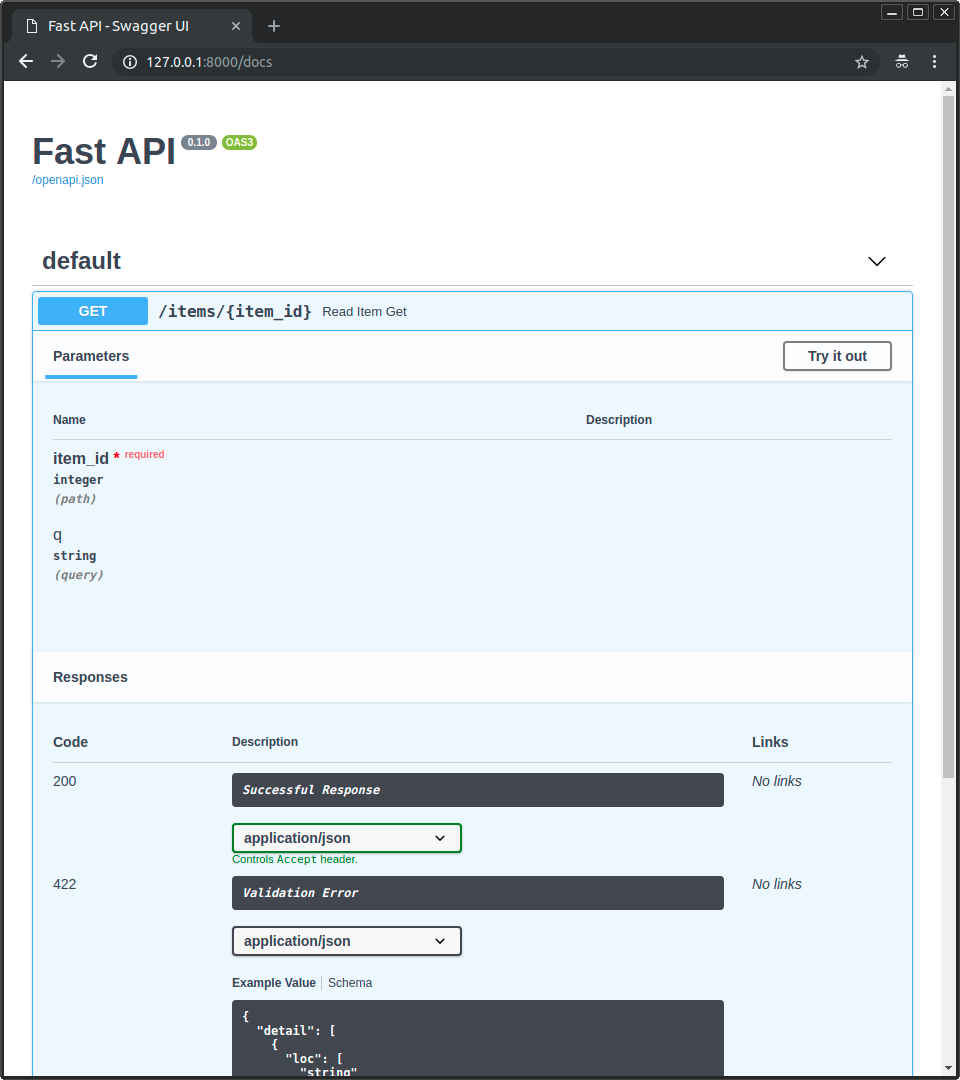
### Alternative API docs
And now, go to http://127.0.0.1:8000/redoc.
You will see the alternative automatic documentation (provided by ReDoc):
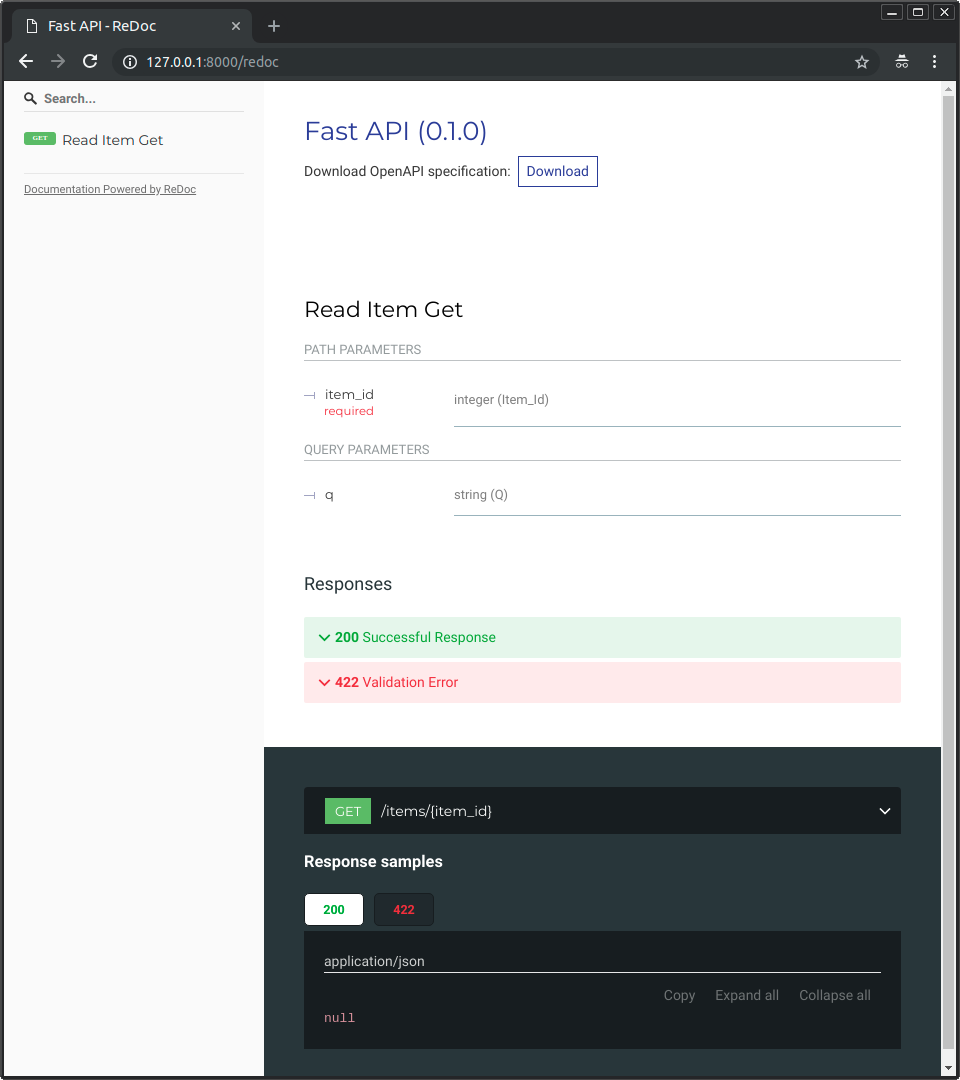
## Example upgrade
Now modify the file `main.py` to receive a body from a `PUT` request.
Declare the body using standard Python types, thanks to Pydantic.
```Python hl_lines="4 9-12 25-27"
from typing import Union
from fastapi import FastAPI
from pydantic import BaseModel
app = FastAPI()
class Item(BaseModel):
name: str
price: float
is_offer: Union[bool, None] = None
@app.get("/")
def read_root():
return {"Hello": "World"}
@app.get("/items/{item_id}")
def read_item(item_id: int, q: Union[str, None] = None):
return {"item_id": item_id, "q": q}
@app.put("/items/{item_id}")
def update_item(item_id: int, item: Item):
return {"item_name": item.name, "item_id": item_id}
```
The server should reload automatically (because you added `--reload` to the `uvicorn` command above).
### Interactive API docs upgrade
Now go to http://127.0.0.1:8000/docs.
* The interactive API documentation will be automatically updated, including the new body:
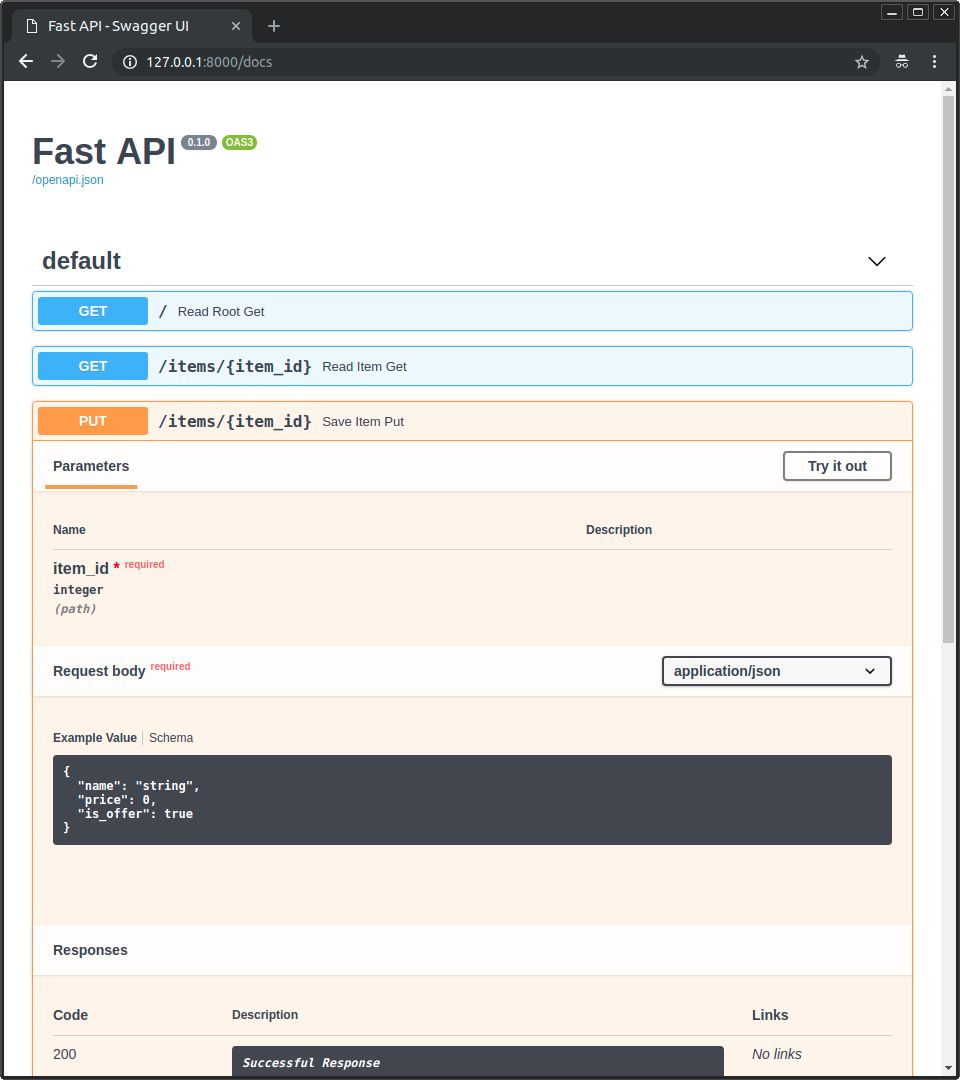
* Click on the button "Try it out", it allows you to fill the parameters and directly interact with the API:
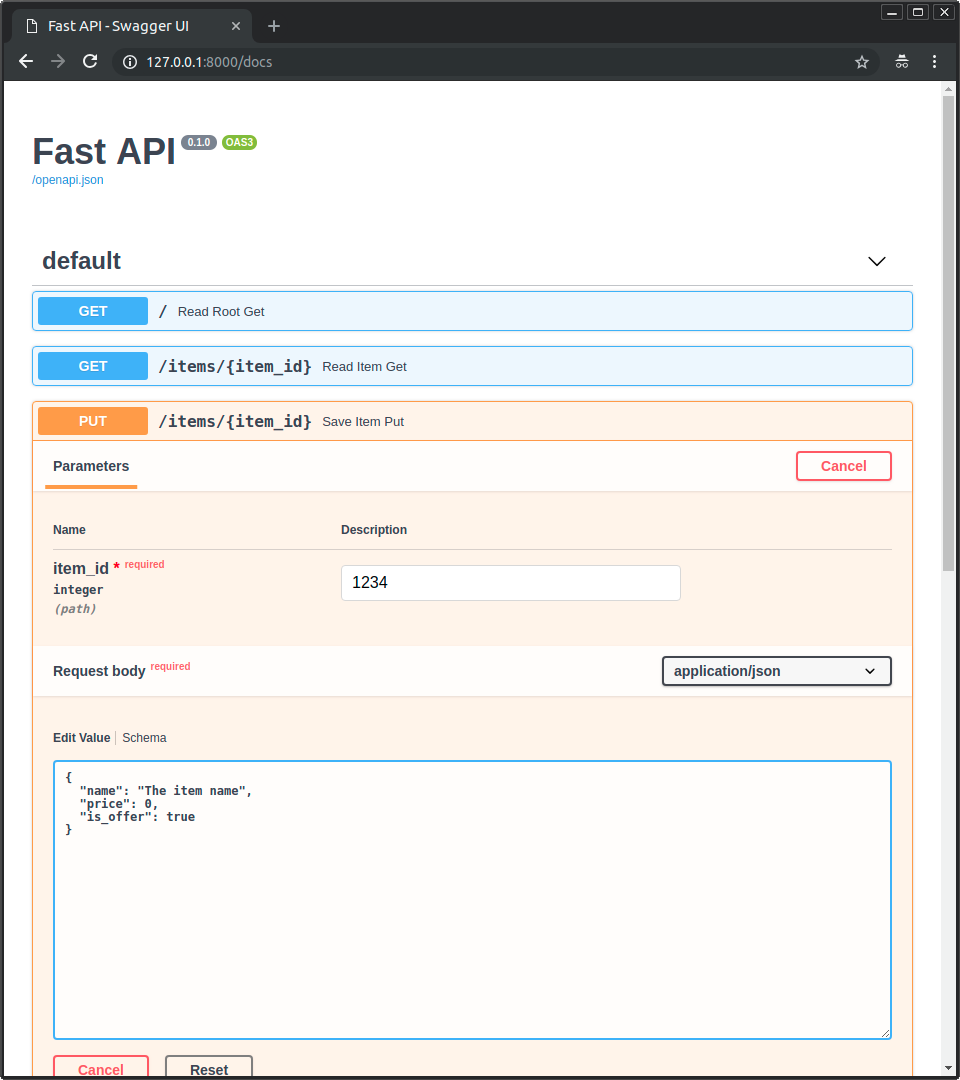
* Then click on the "Execute" button, the user interface will communicate with your API, send the parameters, get the results and show them on the screen:
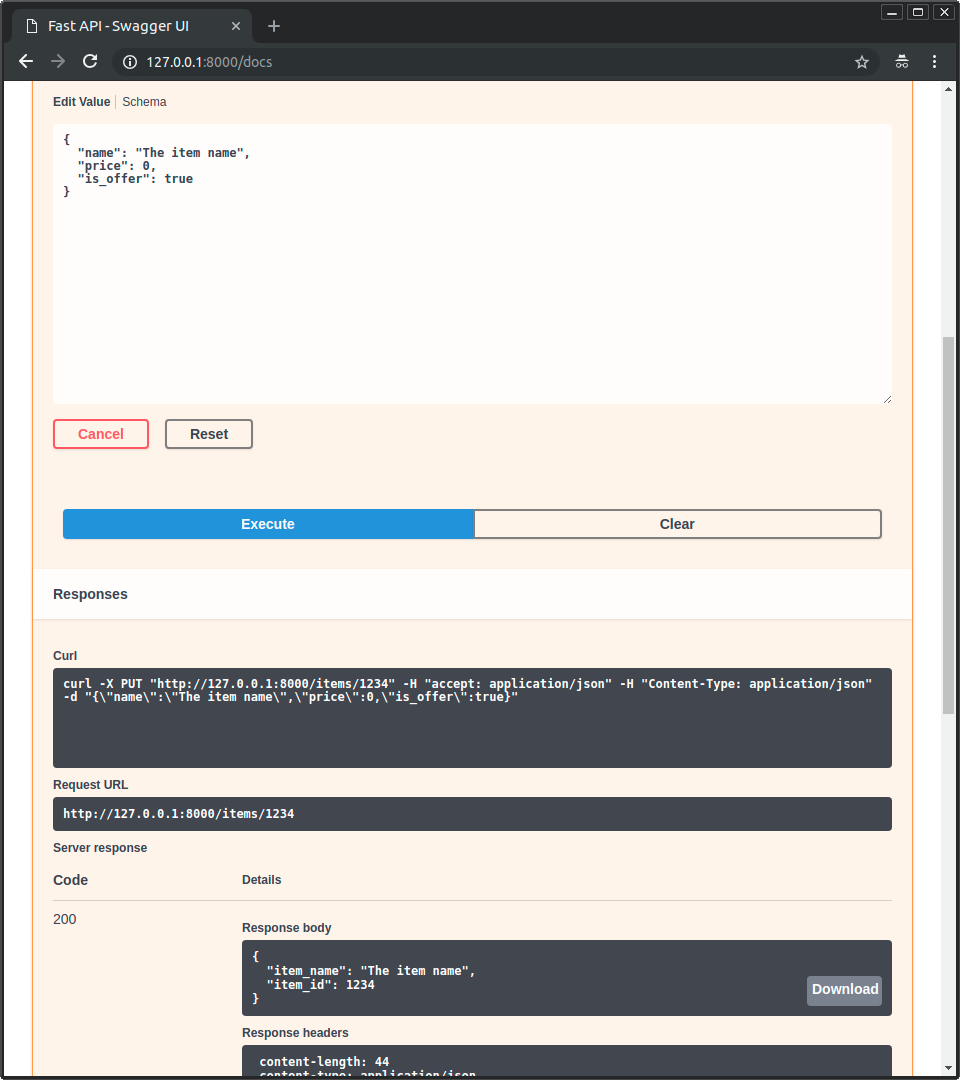
### Alternative API docs upgrade
And now, go to http://127.0.0.1:8000/redoc.
* The alternative documentation will also reflect the new query parameter and body:
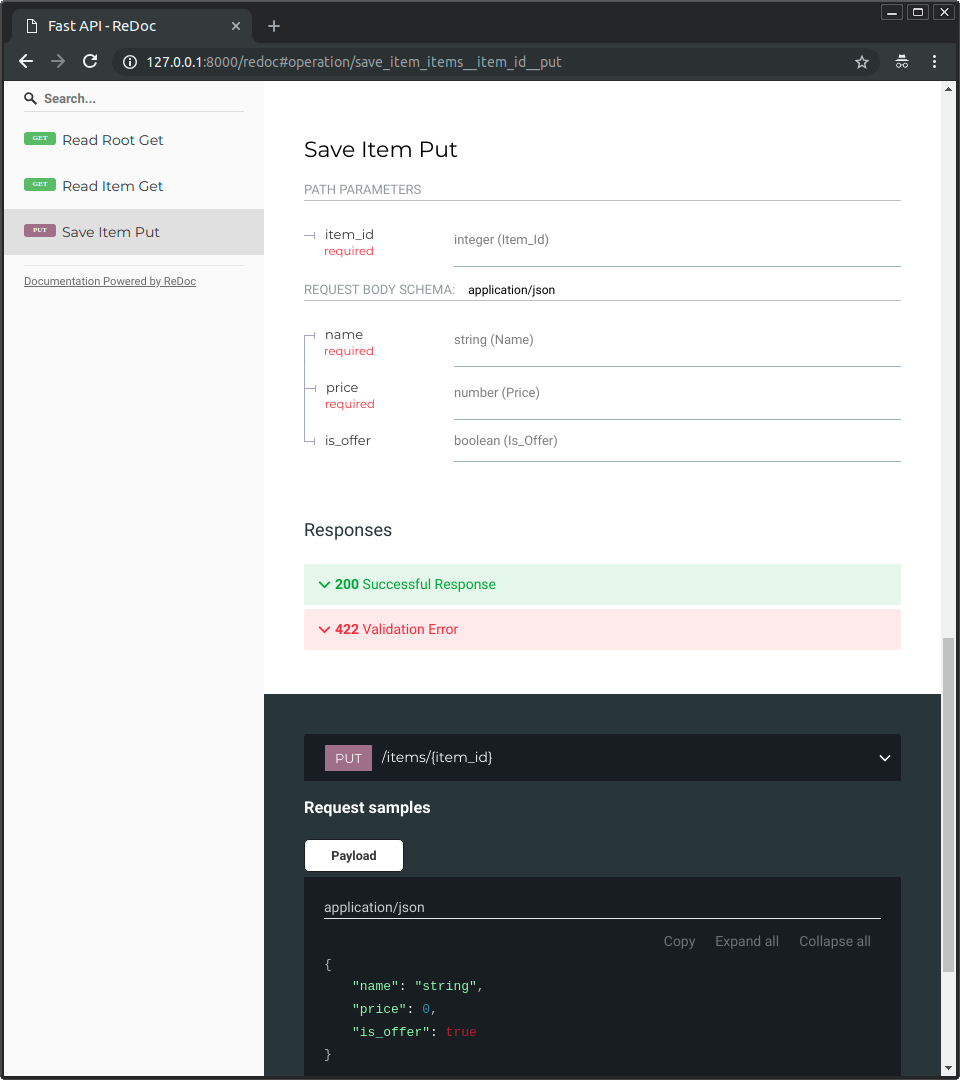
### Recap
In summary, you declare **once** the types of parameters, body, etc. as function parameters.
You do that with standard modern Python types.
You don't have to learn a new syntax, the methods or classes of a specific library, etc.
Just standard **Python 3.6+**.
For example, for an `int`:
```Python
item_id: int
```
or for a more complex `Item` model:
```Python
item: Item
```
...and with that single declaration you get:
* Editor support, including:
* Completion.
* Type checks.
* Validation of data:
* Automatic and clear errors when the data is invalid.
* Validation even for deeply nested JSON objects.
* Conversion of input data: coming from the network to Python data and types. Reading from:
* JSON.
* Path parameters.
* Query parameters.
* Cookies.
* Headers.
* Forms.
* Files.
* Conversion of output data: converting from Python data and types to network data (as JSON):
* Convert Python types (`str`, `int`, `float`, `bool`, `list`, etc).
* `datetime` objects.
* `UUID` objects.
* Database models.
* ...and many more.
* Automatic interactive API documentation, including 2 alternative user interfaces:
* Swagger UI.
* ReDoc.
---
Coming back to the previous code example, **FastAPI** will:
* Validate that there is an `item_id` in the path for `GET` and `PUT` requests.
* Validate that the `item_id` is of type `int` for `GET` and `PUT` requests.
* If it is not, the client will see a useful, clear error.
* Check if there is an optional query parameter named `q` (as in `http://127.0.0.1:8000/items/foo?q=somequery`) for `GET` requests.
* As the `q` parameter is declared with `= None`, it is optional.
* Without the `None` it would be required (as is the body in the case with `PUT`).
* For `PUT` requests to `/items/{item_id}`, Read the body as JSON:
* Check that it has a required attribute `name` that should be a `str`.
* Check that it has a required attribute `price` that has to be a `float`.
* Check that it has an optional attribute `is_offer`, that should be a `bool`, if present.
* All this would also work for deeply nested JSON objects.
* Convert from and to JSON automatically.
* Document everything with OpenAPI, that can be used by:
* Interactive documentation systems.
* Automatic client code generation systems, for many languages.
* Provide 2 interactive documentation web interfaces directly.
---
We just scratched the surface, but you already get the idea of how it all works.
Try changing the line with:
```Python
return {"item_name": item.name, "item_id": item_id}
```
...from:
```Python
... "item_name": item.name ...
```
...to:
```Python
... "item_price": item.price ...
```
...and see how your editor will auto-complete the attributes and know their types:
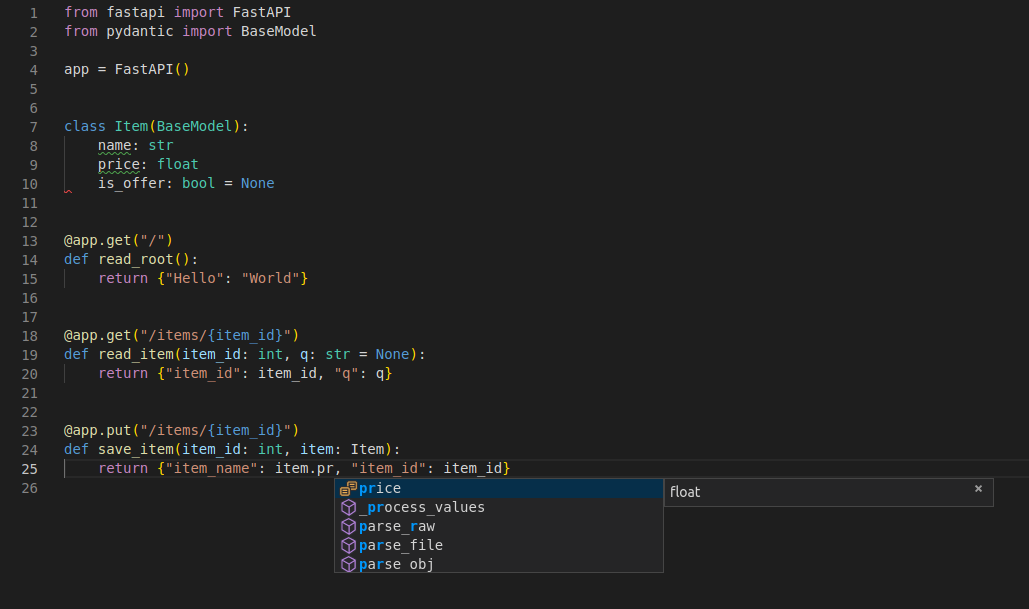
For a more complete example including more features, see the Tutorial - User Guide.
**Spoiler alert**: the tutorial - user guide includes:
* Declaration of **parameters** from other different places as: **headers**, **cookies**, **form fields** and **files**.
* How to set **validation constraints** as `maximum_length` or `regex`.
* A very powerful and easy to use **Dependency Injection** system.
* Security and authentication, including support for **OAuth2** with **JWT tokens** and **HTTP Basic** auth.
* More advanced (but equally easy) techniques for declaring **deeply nested JSON models** (thanks to Pydantic).
* **GraphQL** integration with Strawberry and other libraries.
* Many extra features (thanks to Starlette) as:
* **WebSockets**
* extremely easy tests based on `requests` and `pytest`
* **CORS**
* **Cookie Sessions**
* ...and more.
## Performance
Independent TechEmpower benchmarks show **FastAPI** applications running under Uvicorn as one of the fastest Python frameworks available, only below Starlette and Uvicorn themselves (used internally by FastAPI). (*)
To understand more about it, see the section Benchmarks.
## Optional Dependencies
Used by Pydantic:
* ujson - for faster JSON "parsing".
* email_validator - for email validation.
Used by Starlette:
* requests - Required if you want to use the `TestClient`.
* jinja2 - Required if you want to use the default template configuration.
* python-multipart - Required if you want to support form "parsing", with `request.form()`.
* itsdangerous - Required for `SessionMiddleware` support.
* pyyaml - Required for Starlette's `SchemaGenerator` support (you probably don't need it with FastAPI).
* ujson - Required if you want to use `UJSONResponse`.
Used by FastAPI / Starlette:
* uvicorn - for the server that loads and serves your application.
* orjson - Required if you want to use `ORJSONResponse`.
You can install all of these with `pip install "fastapi[all]"`.
## License
This project is licensed under the terms of the MIT license.












 Other sponsors
## Opinions
"_[...] I'm using **FastAPI** a ton these days. [...] I'm actually planning to use it for all of my team's **ML services at Microsoft**. Some of them are getting integrated into the core **Windows** product and some **Office** products._"
Other sponsors
## Opinions
"_[...] I'm using **FastAPI** a ton these days. [...] I'm actually planning to use it for all of my team's **ML services at Microsoft**. Some of them are getting integrated into the core **Windows** product and some **Office** products._"
 If you are building a CLI app to be used in the terminal instead of a web API, check out **Typer**.
**Typer** is FastAPI's little sibling. And it's intended to be the **FastAPI of CLIs**. ⌨️ 🚀
## Requirements
Python 3.6+
FastAPI stands on the shoulders of giants:
* Starlette for the web parts.
* Pydantic for the data parts.
## Installation
If you are building a CLI app to be used in the terminal instead of a web API, check out **Typer**.
**Typer** is FastAPI's little sibling. And it's intended to be the **FastAPI of CLIs**. ⌨️ 🚀
## Requirements
Python 3.6+
FastAPI stands on the shoulders of giants:
* Starlette for the web parts.
* Pydantic for the data parts.
## Installation